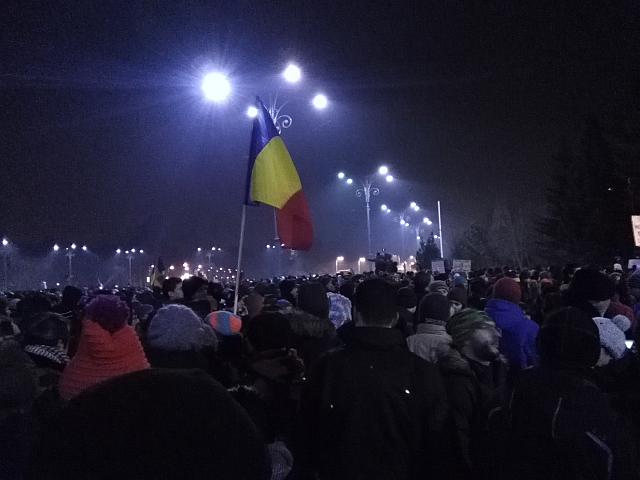Changes to Criminal Laws Draw Fierce Criticism
The amendment of the Criminal Code through an emergency ordinance leads to new massive protests

Bogdan Matei, 01.02.2017, 13:37
Romania has had a day that president Klaus Iohannis himself has described as a “day of mourning, followed by a sleepless night marked by virulent spontaneous protests in all big cities across the country. “It is inadmissible and an act of contempt for the government to adopt, at night and without it being on the agenda for the day, an emergency ordinance in such a sensitive area as the Criminal Code and the Criminal Procedure Code. This cannot be tolerated, said Iohannis after the government formed by the Social Democratic Party and the Alliance of Liberals and Democrats passed an emergency ordinance to amend the criminal codes late on Tuesday night, much to everyones consternation.
Most of the provisions are to come into effect 10 days after publication. One new change refers to the fact that abuse of office is no longer a criminal act if the losses caused as a result are below the equivalent of around 50,000 euros. Aiding an offender, including by passing legislation, such as emergency ordinances in the middle of the night, for example, has also been decriminalised. The act of aiding an offender is also not considered a crime if the act in question is committed by a member of the offenders family and second-degree relatives.
The passing of the changes to the Criminal Code sparked large protests in Bucharest and other big cities in the country. A total of 40,000 people spontaneously took to the streets on Tuesday night despite the biting cold in Bucharest, Cluj Napoca (north-east), Sibiu (centre), Timisoara (west) and Iasi (north-east). In Bucharest alone, more than 12,000 protesters surrounded the government headquarters. The Cabinet led by the Social Democrat Sorin Grindeanu were the first in the last 25 years to leave their office in a van escorted by gendarme forces for protection. What made the demonstrators particularly angry was the manner in which the government acted and which many have described as “thievish.
Last Sunday, almost 100,000 people took to the streets in Romania and abroad to protest against the governments intention to amend the criminal codes and grant collective pardons, which they say would help ease prison overcrowding.
On Monday, Justice Minister Florin Iordache held a debate on the subject and promised he would take into consideration the objections raised. The governments plans had also come under harsh criticism from the heads of the General Prosecutors Office, the National Anticorruption Directorate and the Directorate Investing Organised Crime and Terrorism and from the Superior Council of Magistracy, all of whom said the rule of law was under attack and that the result of years of fighting corruption would be cancelled.
Compared with the famous Operation Clean Hands in Italy to purge the countrys political class, Romanias anti-corruption campaign has seen the indictment of one acting prime minister, former prime ministers, tens of ministers, parliamentarians, prefects, mayors and county council presidents from the ruling parties and the opposition, from across the political spectrum.
The local and international media say the entire government has mobilised to save their political leader, the head of the Social Democratic Party Liviu Dragnea. Serving a two-year suspended sentence handed out last year for trying to rig a 2012 referendum on the impeachment of the then president Traian Basescu, Liviu Dragnea is now on trial at the High Court of Cassation and Justice for incitement to abuse of office. According to prosecutors, he ordered the employment of two members of the Social Democratic Party at the General Directorate of Social Assistance and Child Protection in Teleorman, Dragneas home county. The two were allegedly paid with public funds for fictitious work, having in fact worked exclusively for the party. Prosecutors estimate the damage at some 24,000 euros. Imposing the threshold of almost 50,000 euros for abuse of office to be considered a crime in effect exonerates Dragnea, commentators say.
On the 11th of December, his Social Democratic Party scored a categorical win in the parliamentary elections without any mention of plans to hinder the fight against corruption.
(translated by: Cristina Mateescu)






























